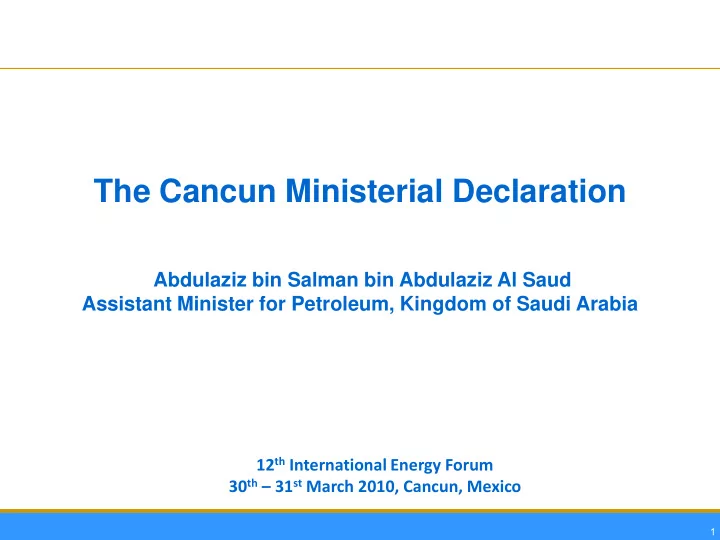

The Cancun Ministerial Declaration Abdulaziz bin Salman bin Abdulaziz Al Saud Assistant Minister for Petroleum, Kingdom of Saudi Arabia 12 th International Energy Forum 30 th – 31 st March 2010, Cancun, Mexico 1
The Jeddah and London Ad-hoc Energy Meetings The Custodian of the Two Holy Mosques, King Abdullah Bin Abdul- Aziz, cognizant of the importance of the producer-consumer dialogue, called for the holding of an ad-hoc energy meeting in Jeddah in June 2008. A further meeting, in London in December 2008, was called for by UK Prime Minister Gordon Brown. Main outcome: To establish an Expert Group to provide recommendations to Ministers for strengthening the architecture of the international dialogue, the IEF, and reducing volatility in energy markets; and A High-Level Steering Group (HLSG) to oversee the terms of reference and work of the Expert Group. All countries that are members of the IEF International Support Group were invited to join the HLSG and to share in the cost of the work of the Expert Group. 2
The High-Level Steering Group Eleven countries volunteered to join the HLSG: Algeria, France, Germany, Japan, Kuwait, Mexico, Norway, Qatar, Saudi Arabia, the United Kingdom and the United States. The Secretariats of the IEF, the IEA and OPEC provided secretarial and technical assistance to the HLSG. Three meetings were held (19 April 2009 in Riyadh, 14 November 2009 in Riyadh and 10 January 2010 in Paris). 3
The Scope of Work of the Expert Group Architecture of the consumer-producer dialogue How can the architecture of the consumer-producer dialogue led by the IEF Secretariat be enhanced? How can the IEF Secretariat be better enabled to achieve its objectives, duties and responsibilities, taking into consideration past performance? What are the present impediments to achieve policy-relevant deliverables and how can they be removed? How can the interface with other international organizations be improved? Energy market volatility How can we enhance our understanding of the technical factors affecting energy market volatility in particular the linkage between financial and energy markets? How can the functioning of energy markets be improved to reduce volatility? What are the potential policy responses and what role can the IEF play in this respect in collaboration and coordination with other relevant organizations and institutions? 4
The Work of the EG and the HLSG The HLSG selected the six independent experts from a list provided by the HLSG members. In its second meeting held in Riyadh on 14 November 2009, the HLSG: discussed with the EG its initial report; and invited the IEA, the IEF and OPEC to identify specific areas for cooperation. In its third meeting held in Paris on 10 January 2010, the HLSG: discussed the EG Report with the experts; and developed its Recommendations and Implementation Plan. The IEA, the IEF and OPEC identified areas for cooperation between them, which were later approved by their respective Boards. 5
The Expanded High-Level Steering Group The HLSG recommendations were submitted to an Expanded High-Level Steering Group (EHLSG). The IEF contributing countries were invited to attend the EHLSG which met on 6 – 7 February 2010 in Riyadh. Main outcome: The Cancun Ministerial Declaration with two attachments: Attachment I: Recommendations and Implementation Plan; and Attachment II: IEA/IEF/OPEC areas for cooperation. 6
Architecture of the Consumer-Producer Dialogue An enhanced framework is needed for the IEF while safeguarding the informality of the dialogue to: reinforce the commitment of producer and consumer countries to the dialogue; and ensure predictable and sustainable funding of the IEF Secretariat at an adequate level that is commensurate with the expanded role and additional tasks of the IEF. The IEF and its Secretariat need a Charter to incorporate the enhanced framework. The Charter would be approved at a Ministerial Meeting. State support for the Charter by written official communication to the SG of the IEF Secretariat. 7
The Guiding Principles for the IEF Charter The IEF should be open to all states that support the Charter; The Charter should enhance the critical role of the Secretariat; The Executive Board would have oversight responsibility. Its composition should be a combination of permanent members, consisting of the major energy producers and consumers to enable their consistent engagement in the dialogue, and rotating members; The International Support Group should be upgraded to facilitate greater engagement of countries that do not participate in the Executive Board; Funding should be designed to ensure the provision by the members of adequate and predictable financial resources, in accordance with a formula mutually-determined by the members; The IEF could hold Extraordinary Ministerial Meetings. 8
The IEF Charter The IEF Charter will be developed through an inclusive and transparent process. A newly established HLSG will oversee the drafting of the IEF Charter, including selection of experts as needed. The draft IEF Charter will be finalized by a newly constituted EHLSG, composed of all countries that approve the Cancun Ministerial Declaration. The IEF Charter will be submitted for approval to a Ministerial Meeting, to be held in Riyadh before March 2011. This Meeting will coincide with the 20 th anniversary of the producer-consumer dialogue. 9
The Cancun Ministerial Declaration Abdulaziz bin Salman bin Abdulaziz Al Saud Assistant Minister for Petroleum, Kingdom of Saudi Arabia 12 th International Energy Forum 30 th – 31 st March 2010, Cancun, Mexico 10 10
Recommend
More recommend